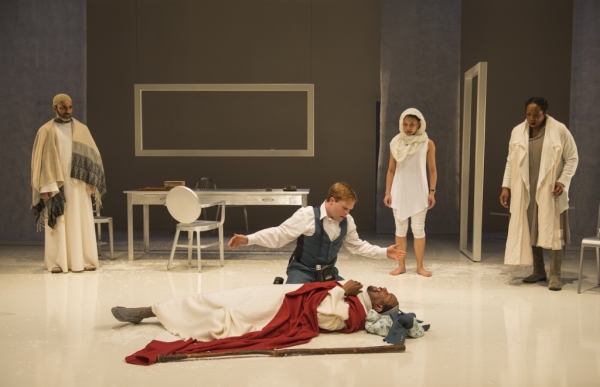
(© Michael Brosilow)
As you might infer from the title, Court Theatre's world premiere of Lisa Peterson and Denis O'Hare's The Good Book is an ambitious work. As described by Miriam, the biblical scholar at the heart of the story, the titular tome is a dark and mysterious mansion filled with twisting hallways and shadowy rooms. Peterson and O'Hare's foray into that formidable space takes audiences on a journey into the history and mystery of the Bible's authorship.
That might sound like a topic better suited for an academic seminar than a theater. But The Good Book is enthrallingly dramatic, a narrative thriller that spirals through millennia and into the afterlife. Peterson and O'Hare have juxtaposed the Bible's murky origins against the spiritual crises of a contemporary Catholic schoolboy and an atheist biblical scholar. Peterson, who also directs, weaves dance, music, and mesmerizing video projections into the narrative, creating a kaleidoscopic story that dazzles, shatters, and recombines to form a fascinating whole.
From the desperate flight of Middle Eastern farmers hiding precious scrolls in woven baskets of fruit to the conference room of 21st-century academics arguing over gender references in the book of Matthew, The Good Book packs plenty of vividly rendered history into its nearly three-hour run time. The politics and passions that turned an oral tradition into a mass-produced object readily available in any given hotel room are labyrinthine and – in many cases – hotly debated. The Good Book provides an intriguing outline of what many scholars think they know about the Bible's authorship, while still emphasizing the impact that random events had on a book millions hold sacred. A cranky scribe, a hungry refugee more inclined to bring a basket of figs rather than a basket of scrolls into the desert, or a malfunctioning Gutenberg press just might have had as much influence on the Bible as, say, a holy man taking dictation from the Divine.
Given the myriad conflicting explanations of the Bible's origins and interpretations, it's fitting that the scholar Miriam (Hollis Resnik) and the teenage Connor (Alex Weisman) become profoundly at odds with a book both have exhaustively studied (albeit for radically different purposes). Weisman and Resnik create characters that are immediately, intensely empathetic. Miriam is a powerhouse, whether at vehement odds with a student who is an Evangelical Christian or a significant other whose spirituality both enrages her and leaves her bereft. Weisman moves from the giddy innocence of a true believer untested by the cruel curve balls that life invariably throws to the wrenching disappointment of somebody robbed of nearly everything they hold dear. His scene in a confessional after a first, traumatic excursion into his sexuality is a heartbreaker.
The Resnik and Weisman are ably supported by an ensemble (Emjoy Gavino, Jacqueline Williams, Kareem Bandealy, Erik Hellman and Allen Gilmorex) who fill the stage with an array of shepherds, scholars, scribes, and disciples. Peterson and O'Hare's use of original music is terrifically effective, especially in a sonic and visually gorgeous scene of medieval illuminators whose meticulous work unfurls in a mesh of surrounding video. Rachel Hauck's spare set is appropriately versatile as the story moves from Mesopotamia to classroom to church to adolescent bedroom.
As The Good Book swerves through the dark mansion of Miriam’s opening monologue, the mood whiplashes between fear, ecstasy, rage and despair. O’Hare and Peterson don’t try to untangle the play’s final collision (both literal and figurative) between faith and non-belief. There are no clear answers in The Good Book, only a series of searingly vivid and dramatically rich questions.









